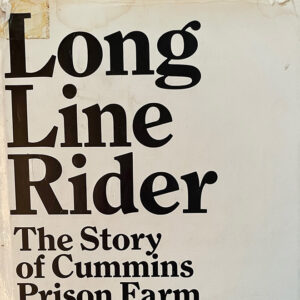calsfoundation@cals.org
Long Line Rider [Book]
Long Line Rider: The Story of Cummins Prison Farm is a 1971 novel by former prison inmate K. Wymand Keith, the pen name of Leonard Claude Bowen. Based on the author’s experiences at Cummins, the novel appeared at the height of prison reform efforts in Arkansas in the early 1970s. As is true of other writings by former Arkansas inmates, the book, while fiction, corroborates the reported abuses of the pre-Rockefeller period.
Long Line Rider takes its name from the riders who supervised lines of other inmates working in the cotton and soybean fields. The riders were trusties (so called because they were trusted by authorities) who lived at the top of the prison hierarchy. At the time, Arkansas prison farms had few “free world” employees. To save money and shirk professional standards and civil rights, Arkansas let inmates run the prisons. Long line riders were armed with shotguns and patrolled the plantations on horseback, much like the overseers of the slavery period.
In the novel, the narrator is apprehended for passing a bad $5,000 check to pay for jewelry while in Dardanelle (Yell County). With him is a female companion named Violet. Once arrested, he and Violet are met with abuse and torture. The narrator is beaten by police and detained illegally in Russellville (Pope County) before he goes to court. The narrator’s trial is a sham. He is denied adequate legal representation when the arresting sheriff is appointed his lawyer by the judge.
The narrator is given five years in prison for the bad check and another five years for “uttering” (intent to commit fraud). He is sent to Cummins, but Violet is sent to Little Rock (Pulaski County), where she is raped and tortured to death by authorities.
Once in Cummins, the narrator is shocked to learn that prisoners act as guards and are allowed to carry guns. He is also surprised to see that there are no walls as in typical prisons. Instead, men live in barracks surrounded by cotton and bean fields. The narrator comments that while Arkansas thinks it can deter crime through brutal prison conditions, some men are repeat offenders—obviously incarceration does not have a positive effect on recidivism.
Despite being a self-described “wild Indian from Okieland,” the narrator wants to fit in with the other prisoners and not make trouble. He acquires the nickname “Dardanelle,” based on where he was arrested (other inmates are similarly named). Dardanelle quickly learns that disobedience can exact brutal treatment, from having nails slid under a man’s fingernails to the infamous “Tucker Telephone” electrocution torture. Intelligent and cautious, Dardanelle moves up the prison hierarchy, first becoming a “do’ pop” (a play on their practice of “popping open doors” for higher-ranking prisoners). A fellow inmate and long line rider named Stud eases his transition to prison life. Despite Stud’s friendliness, Dardanelle calls Cummins farm the “nation’s roughest prison.” When Stud is unavailable to work one day, Dardanelle is picked to serve as a trusty and long line rider. He learns that Stud was “kicked by a mule” and killed. Dardanelle, though, does not believe he died accidentally.
In straight-forward, uncluttered prose, Keith provides the reader with authentic descriptions of life at Cummins. Abuse and corruption, Keith shows, were commonplace, from the censoring of mail and exhausting days of cotton picking to meatless starvation diets. Violent offenses occur with regularity, such as the shooting of men inside the barracks and the use of the strap for whipping. One man is killed for stealing; others have fingers broken for minor infractions.
The novel shows the capriciousness of the prison system. Inmates are given great power over life and death, and the men below them are never sure how this power will be wielded. Accountability is non-existent. Dardanelle has authority as a trusty, but he chooses not to be cruel. He arranges for the release of one prisoner—an act that wins him the admiration of the sinister warden, Captain Jones.
The benefits of being a trusty are clear. In one Christmas scene, Keith describes the men eating good beef, drinking Scotch, and having access to a sexy, scantily clad woman. Dardanelle, nevertheless, runs afoul of a brutal trusty named “the Bull,” who threatens to kill him one day in the fields.
To escape their work detail, Dardanelle and another prisoner named “Caveman” cut their heel tendons so they are useless on the long line. Inmates, however, quickly put Dardanelle on the operating table, where his tendons are stitched back together without anesthesia. An infection sets in, but he is eventually given life-saving penicillin by the same Cummins doctor—“Doc Vet”—who had operated on him.
Despite its horrors, the novel ends on a hopeful note. Dardanelle meets Judge Berry (a stand-in for politician Francis Cherry), who is running for governor and prioritizes prison reform. In the public’s eyes, though, more important than the brutality taking place at the prisons is the financial mismanagement of cotton production. Berry promises more transparency in accounting, and Dardanelle is given the opportunity to speak about prison abuses during a radio broadcast. Judge Berry narrowly wins the election and pardons Dardanelle for helping him on the campaign trail.
Before he leaves, Dardanelle is given the chance to return to the long line by Captain Jones. He refuses and makes it clear how he feels about the prison. While he is revolted by life at Cummins, Dardanelle appeals to Jones’s pride and financial success. He argues that brutality and corruption are counterproductive. Better treatment, he feels, would make for better workers and a more productive plantation.
Captain Jones, impressed with Dardanelle’s forthrightness—and hoping to avoid any problems with the new governor—allows Dardanelle and his friend Caveman to undertake a new work detail. They will spend most of their day in the vegetable shack, where they are mostly left alone with light duties. Dardanelle enjoys his new situation, but he is soon pardoned and released from Cummins.
Long Line Rider was published with the prison scandals of the Winthrop Rockefeller period fresh in people’s minds. By 1971, Dale Bumpers had succeeded Rockefeller as governor and had introduced his own reform agenda. Some Arkansans might have suffered from scandal fatigue. Tucker Steinmetz of the Arkansas Democrat was unimpressed with Keith’s book. He complained that the novel “says nothing that hasn’t been said scores of times in and out of courts over the past few years.” He also did not appreciate Keith’s repeated use of dialect and desire to make Arkansas look backward.
Despite its flaws, the book serves as a stark and (for historians) useful account of life at Cummins. It is unclear how many copies of Long Line Rider were sold. The book was never published in paperback. Given that it was published by a prominent New York press, Keith’s was the most publicized book by an inmate for decades.
For additional information:
“Bowen Says He Will Return to Dig for Bodies.” Northwest Arkansas Times, July 12, 1971.
“K. Wymand Keith.” In Contemporary Authors, Vol. 226, edited by Julie Keppen. Detroit: Gale, 2004.
Keith, K. Wymand. Long Line Rider: The Story of Cummins Prison Farm. New York: McGraw-Hill, 1971.
Steinmetz, Tucker. “Ex-Inmate’s Novel Aims at Cummins.” Arkansas Democrat Magazine, May 16, 1971.
Colin Edward Woodward
Richmond, Virginia
 Divergent Prosperity and the Arc of Reform, 1968–2022
Divergent Prosperity and the Arc of Reform, 1968–2022 Literature and Authors
Literature and Authors Long Line Rider [Song]
Long Line Rider [Song] Long Line Rider
Long Line Rider 




Comments
No comments on this entry yet.